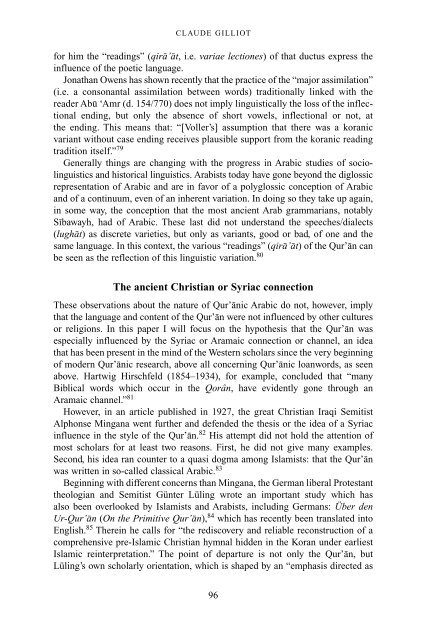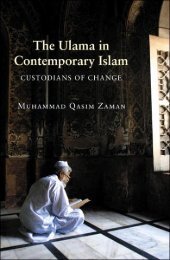The Qur'an in its historical context (pdf - Islam and Christian-Muslim ...
The Qur'an in its historical context (pdf - Islam and Christian-Muslim ...
The Qur'an in its historical context (pdf - Islam and Christian-Muslim ...
Create successful ePaper yourself
Turn your PDF publications into a flip-book with our unique Google optimized e-Paper software.
CLAUDE GILLIOT<br />
for him the “read<strong>in</strong>gs” (qira’at, i.e. variae lectiones) of that ductus express the<br />
<strong>in</strong>fluence of the poetic language.<br />
Jonathan Owens has shown recently that the practice of the “major assimilation”<br />
(i.e. a consonantal assimilation between words) traditionally l<strong>in</strong>ked with the<br />
reader Abu ‘Amr (d. 154/770) does not imply l<strong>in</strong>guistically the loss of the <strong>in</strong>flectional<br />
end<strong>in</strong>g, but only the absence of short vowels, <strong>in</strong>flectional or not, at<br />
the end<strong>in</strong>g. This means that: “[Voller’s] assumption that there was a koranic<br />
variant without case end<strong>in</strong>g receives plausible support from the koranic read<strong>in</strong>g<br />
tradition <strong>its</strong>elf.” 79<br />
Generally th<strong>in</strong>gs are chang<strong>in</strong>g with the progress <strong>in</strong> Arabic studies of sociol<strong>in</strong>guistics<br />
<strong>and</strong> <strong>historical</strong> l<strong>in</strong>guistics. Arabists today have gone beyond the diglossic<br />
representation of Arabic <strong>and</strong> are <strong>in</strong> favor of a polyglossic conception of Arabic<br />
<strong>and</strong> of a cont<strong>in</strong>uum, even of an <strong>in</strong>herent variation. In do<strong>in</strong>g so they take up aga<strong>in</strong>,<br />
<strong>in</strong> some way, the conception that the most ancient Arab grammarians, notably<br />
Sibawayh, had of Arabic. <strong>The</strong>se last did not underst<strong>and</strong> the speeches/dialects<br />
(lughat) as discrete varieties, but only as variants, good or bad, of one <strong>and</strong> the<br />
same language. In this <strong>context</strong>, the various “read<strong>in</strong>gs” (qira’at) of the Qur’an can<br />
be seen as the reflection of this l<strong>in</strong>guistic variation. 80<br />
<strong>The</strong> ancient <strong>Christian</strong> or Syriac connection<br />
<strong>The</strong>se observations about the nature of Qur’anic Arabic do not, however, imply<br />
that the language <strong>and</strong> content of the Qur’an were not <strong>in</strong>fluenced by other cultures<br />
or religions. In this paper I will focus on the hypothesis that the Qur’an was<br />
especially <strong>in</strong>fluenced by the Syriac or Aramaic connection or channel, an idea<br />
that has been present <strong>in</strong> the m<strong>in</strong>d of the Western scholars s<strong>in</strong>ce the very beg<strong>in</strong>n<strong>in</strong>g<br />
of modern Qur’anic research, above all concern<strong>in</strong>g Qur’anic loanwords, as seen<br />
above. Hartwig Hirschfeld (1854–1934), for example, concluded that “many<br />
Biblical words which occur <strong>in</strong> the Qorân, have evidently gone through an<br />
Aramaic channel.” 81<br />
However, <strong>in</strong> an article published <strong>in</strong> 1927, the great <strong>Christian</strong> Iraqi Semitist<br />
Alphonse M<strong>in</strong>gana went further <strong>and</strong> defended the thesis or the idea of a Syriac<br />
<strong>in</strong>fluence <strong>in</strong> the style of the Qur’an. 82 His attempt did not hold the attention of<br />
most scholars for at least two reasons. First, he did not give many examples.<br />
Second, his idea ran counter to a quasi dogma among <strong>Islam</strong>ists: that the Qur’an<br />
was written <strong>in</strong> so-called classical Arabic. 83<br />
Beg<strong>in</strong>n<strong>in</strong>g with different concerns than M<strong>in</strong>gana, the German liberal Protestant<br />
theologian <strong>and</strong> Semitist Günter Lül<strong>in</strong>g wrote an important study which has<br />
also been overlooked by <strong>Islam</strong>ists <strong>and</strong> Arabists, <strong>in</strong>clud<strong>in</strong>g Germans: Über den<br />
Ur-Qur’an (On the Primitive Qur’an), 84 which has recently been translated <strong>in</strong>to<br />
English. 85 <strong>The</strong>re<strong>in</strong> he calls for “the rediscovery <strong>and</strong> reliable reconstruction of a<br />
comprehensive pre-<strong>Islam</strong>ic <strong>Christian</strong> hymnal hidden <strong>in</strong> the Koran under earliest<br />
<strong>Islam</strong>ic re<strong>in</strong>terpretation.” <strong>The</strong> po<strong>in</strong>t of departure is not only the Qur’an, but<br />
Lül<strong>in</strong>g’s own scholarly orientation, which is shaped by an “emphasis directed as<br />
96



